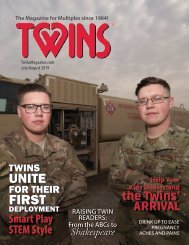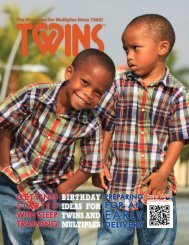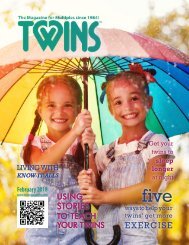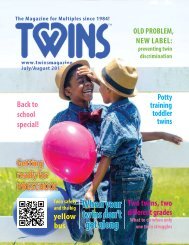2007GuideToTheFirstYear
Create successful ePaper yourself
Turn your PDF publications into a flip-book with our unique Google optimized e-Paper software.
To pacify...<br />
or not?<br />
The World Health Organization discourages the use of pacifiers,<br />
based on the belief that they interfere with successful<br />
breastfeeding.<br />
North American studies indicate pacifier use—especially<br />
with very young infants—may indirectly interfere with continued<br />
and exclusive breastfeeding. In these studies, women who<br />
introduced a pacifier to babies in their first 4 weeks of life tended<br />
to breastfeed less frequently, perhaps because babies with pacifiers<br />
demanded feeding less often. As a result, these mothers<br />
reported having more breastfeeding problems as feedings decreased.<br />
Shortened breastfeeding periods were also thought to<br />
be a consequence of less-frequent feeding.<br />
One study also concluded a pacifier is no more effective in<br />
calming a fussy infant than rocking, holding or breastfeeding.<br />
If you're breastfeeding, you may want to hold off on offering<br />
pacifiers to your twinfants in the first month. If, after they are<br />
4 weeks old, your babies need to suck for substantially longer<br />
than your normal nursing time, a pacifier—or their hands or<br />
thumbs—may help. But never use a pacifier to placate a hungry<br />
baby so that you can delay feeding, at any age.<br />
If you use pacifiers, be safe. Look for a one-piece pacifier<br />
with a soft nipple and a shield at least 1¼ inches wide made of<br />
firm plastic containing air holes. (Do not use a nipple from a<br />
baby bottle as a pacifier. If the baby sucks hard, the nipple can<br />
pop out of its ring and choke a infant.)<br />
Never tie a pacifier around a baby’s neck or hand, or to a<br />
crib. This can create a serious risk of injury or death.<br />
Introducing...<br />
FetalHopeFoundation<br />
Helping protect your Right to Know<br />
when diagnosed with a fetal<br />
distress during a complicated<br />
or difficult pregnancy.<br />
For more information on<br />
fetal syndromes supported<br />
by Fetal Hope, call us at<br />
1-877-789-HOPE, or<br />
THERIGHT<br />
to<br />
KNOW<br />
A FETAL HOPE<br />
FOUNDATION<br />
PROJECT . 2007<br />
visit www.fetalhope.org.<br />
Helping you become the<br />
best advocate for you<br />
and your family.<br />
TwinTips—Maintaining<br />
Healthy TwinSkin:<br />
■ Use unscented, hypo-allergenic baby moisturizer, if any.<br />
Babies' skin is filled with moisture and moisturizer isn't<br />
really needed.<br />
■ Hot water dries the skin. Warm or tepid water is best.<br />
■ Avoid harsh soaps that remove oils from the skin. Opt<br />
instead for a mild soap with a moisturizer.<br />
■ Pat skin dry after washing; don’t rub.<br />
■ Double rinse machine-washed clothing and bedding.<br />
Avoid fabric softeners, which may irritate skin.<br />
■ 100% cotton clothing, bedding and towels are best.<br />
■ Clip and clean your twins’ fingernails frequently.<br />
© 2007 TWINS Magazine. To subscribe: call 1-888-55-TWINS or www.TwinsMagazine.com GUIDE TO THE FIRST YEAR 27


















